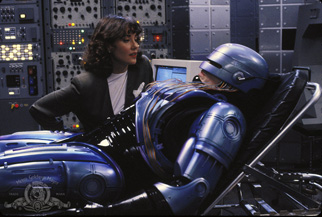|
|
Viking Night: Robocop 2By Bruce HallApril 19, 2017
The original RoboCop was the story of a dedicated, family-oriented cop who was murdered, brought back as a cyborg, and given the chance to hunt down his own killers. It was essentially a dime store Western, told in a way that invited an accompaniment of heavy metal guitar licks. But the story also devoted a little - and only JUST a little - time to the question of how this might affect someone on a human level. At some point in every RoboCop movie, we’re reminded that our hero is nothing more than a few chunks of meat inside that armor. His time is never his own, and the people who built him speak to him not as a dog (which might be welcome), but as an appliance. Inside that sweet-ass battle chassis is a very human brain, containing everything that defines Alex Murphy. And he would gladly trade the ability to rip off car doors and never run out of ammunition for the ability to go back home to his family. There is a scene in the first film where he visits his former home, aware of his past life but burdened by his inability connect with it. It is in this light that the character of RoboCop has always interested me. Now obviously, few things delight me more than an emotionally unstable policebot, pounding on murderers and rapists with his vengeful titanium fists. But the real story of RoboCop is (what’s left of) the man inside the suit, and how he feels about being inside it. So, in that respect, RoboCop 2 is reheating old food, but I would argue that Murphy's personal struggles receive a little more attention this time around. I found myself very interested in something that in my opinion, the first movie didn’t explore quite deeply enough. It’s a sad, lonely life for Murphy, and the closest we see him come to true human contact is as he holds the hand of a dying criminal late in the film. Murphy is clearly contemplating the process of violent death, with which he is all too familiar. And Weller does all he can to robo-emote from beneath 60 pounds of plastic and rubber. Yes, the scene wanders dangerously close to hokum, but it’s always kind of worked for me. The pain in Weller’s voice is palpable, and you can almost hear him lamenting the irony of a resurrected man again made helpless in the face of death. No, it’s not Oscar material. But I appreciated the effort anyway.
|

|
|
|

|
Friday, November 1, 2024
© 2024 Box Office Prophets, a division of One Of Us, Inc.


